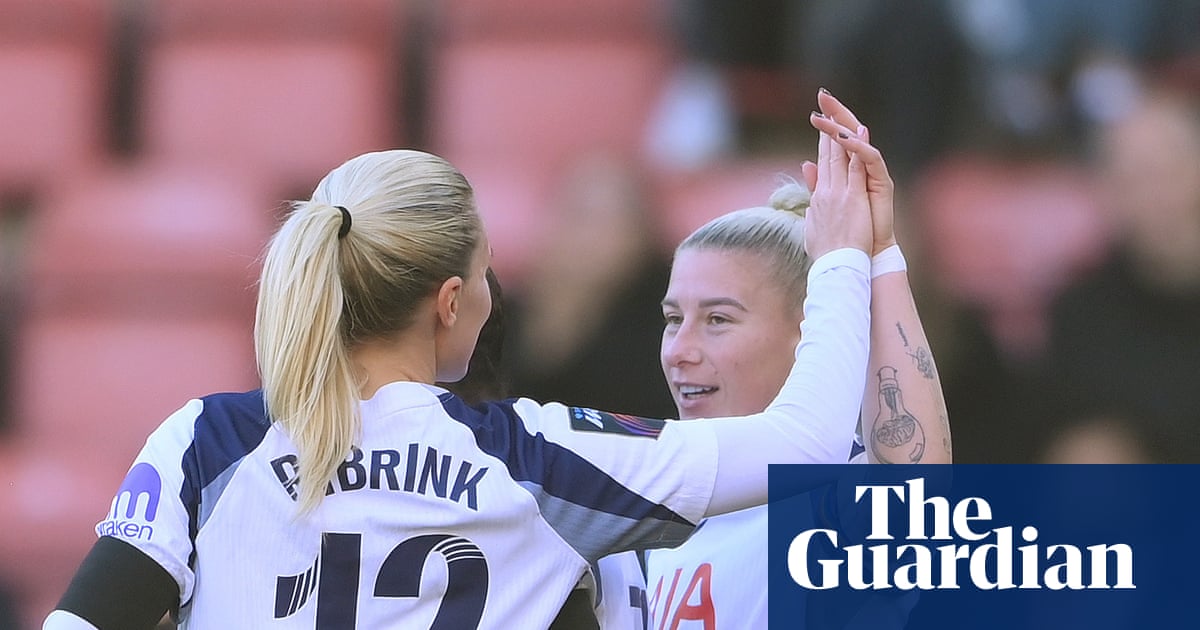Hot off a gig where she was selling a bar of “morning wood” soap containing her used bathwater, the actor Sydney Sweeney is making headlines for another dubious advert. This one is for American Eagle and the campaign line idea is that Sweeney, clad in denim, has great jeans. Get it?
An apparel company employing a zeitgeisty actor and exploiting an obvious genes/jeans pun to flog denim would not normally be noteworthy. But the the ad has sparked an intense online discussion, one which has now bubbled up to the White House, about whether having a blonde-haired, blue-eyed actor – who happens to keep pretty quiet about politics – talking about her great genes is a racist dog-whistle and nod to eugenics.
The supporting evidence for this is a campaign video (which appears to have been removed after backlash) in which Sweeney, looking at the camera suggestively, says: “My body’s composition is determined by my genes.” There’s then a little joke about the cameraperson looking at her breasts before she continues: “Genes are passed down from parents to offspring, often determining traits like hair color, personality, and even eye color … My jeans are blue.”
In a TikTok reaction video with almost 300,000 likes , one influencer accuses the Euphoria actor of ignoring the current political climate. “It’s literally giving, I don’t know if I should say this, Nazi propaganda,” the TikToker proclaimed. (Probably shouldn’t have said that, to be honest.) She also asked, exasperated: “Why do you need to sexualize jeans so much?” Oh, my sweet summer child, have you never seen an advert before? Sex supposedly sells (although studies refute this piece of advertising wisdom) and even toothpaste will get sexualized.
The pockets of liberal outrage over the Sweeney ad have been a godsend to Fox News, which has covered the backlash to the ad campaign 28 times more than it covered the Epstein controversy this week. Even White House staffers have spoken out about this extremely important issue. “Cancel culture run amok,” White House communications manager Steven Cheung wrote of the ad on X. “This warped, moronic and dense liberal thinking is a big reason why Americans voted the way they did in 2024...” Conservative TV personality Megyn Kelly also decried the “lunatic left” getting upset about nothing.
You wait your whole life for an advert with a weird fixation on genetics to come out and then, what do you know, two come along at once. Instead of the American Eagle controversy fizzling out after a couple of days of online outrage, the story took on new dimensions this week after people noticed that a new Dunkin’ ad for its Golden Hour refresher (some kind of alarmingly yellow beverage) also mentions genetics.
“This tan? Genetics,” actor Gavin Casalegno, says in the ad. “I just got my color analysis back. Guess what? Golden summer, literally!”
More like Angry Influencer summer, literally! “Why are ads so obsessed with genetics all of a sudden?” one TikTok user commented on Dunkin’s post. Another asked: “Genuinely, what does a drink have to do with genetics?” (Again, have none of these people ever seen an advert before? Chocolate has nothing to do with gorillas, and the Cadbury’s ‘drumming gorilla’ ad is one of the greatest pieces of marketing of all time.)
It is established wisdom that you need at least three examples to call something a “trend”. Unless a toothpaste advert featuring bright white teeth (the result of my superior genetics!) drops while I write this, we’re currently at “weird coincidence” rather than full-blown conspiracy. But this isn’t to say that we should dismiss all the buzz as a load of influencers getting angry about nothing. Adverts hold a mirror up to society and the repeated reference to genetics does say something about the current moment.
Perhaps what it screams the loudest is that brands are no longer concerned about trying to look progressive. For just under a decade (ending around 2022) we were very much in the era of woke-vertising, where brands were busy trying to co-opt feminism and activist culture.

There was, for example, that famous Kendall Jenner Pepsi ad in 2017 in which Jenner creates world peace by giving a police officer at a protest a Pespi. In the same year a financial firm installed a “‘Fearless Girl’” statue by the famous Charging Bull in Wall Street, to make a point about how investment banking is empowering, actually. And even Victoria’s Secret got a “feminist” rebrand in 2017. Ad agencies also spent a lot of time pulling together panels about how important diversity is. (I worked in advertising for a long time and was on a lot of those panels.) Now that Trump has declared war on DEI, a lot of companies have gleefully done away with pretending to care about diversity or feminism.
While I don’t think the American Eagle and Dunkin’ ads are in any way a nod to eugenics, I’m also not sure that they would have come out in 2020, when the George Floyd protests meant racism was a national conversation. There would probably have been a lot more sensitivity to how references to genetics might get perceived.
The repeated reference to genes also reflects the way in which certain eugenicist views have started to move from the racist fringes into mainstream culture.
Elon Musk has repeatedly said he wants smart people to have more kids, for example; a common refrain in pro-natalist circles. Meanwhile Simone and Malcolm Collins, who have been dubbed “hipster eugenicists”, have generated a million headlines for their quest to have an army of genetically-optimized children via IVF. Meanwhile more start-ups are popping up that promise to screen IVF-created embryos for ‘desirable’ traits.
One service has suggested that people who use their service might end up with a child who is, on average, six IQ points smarter than the child they would have had through natural conception. American Eagle may not be selling eugenics to the masses quite yet, but we are certainly entering an era of designer genes.

 3 months ago
42
3 months ago
42

















































